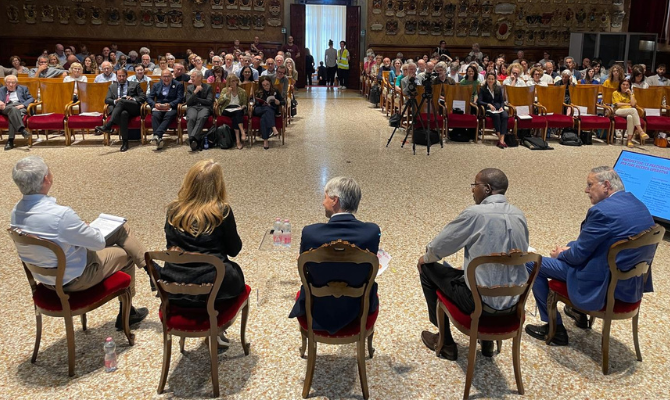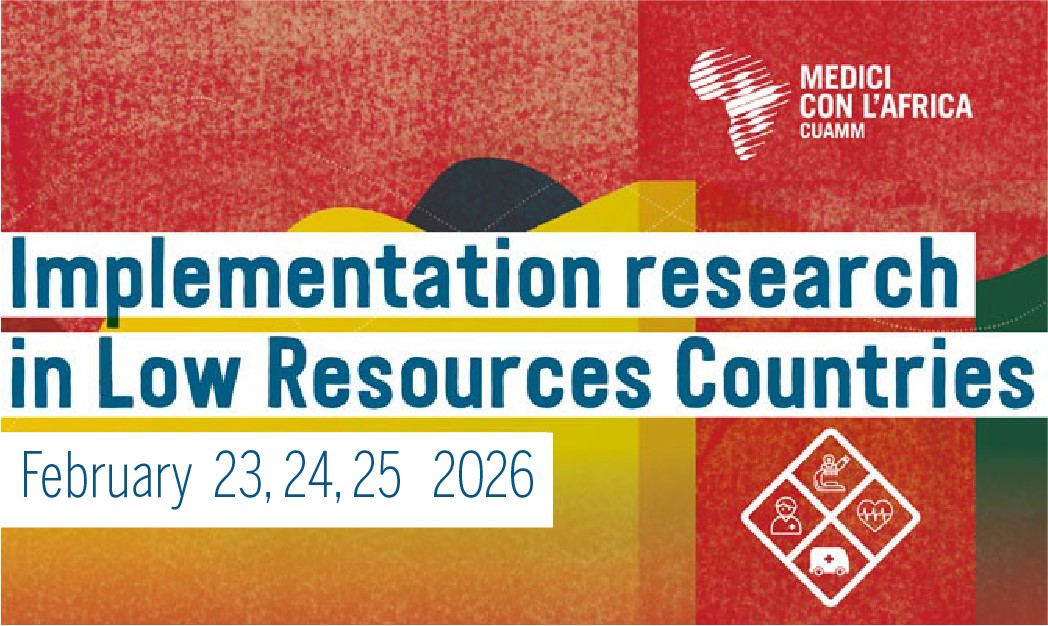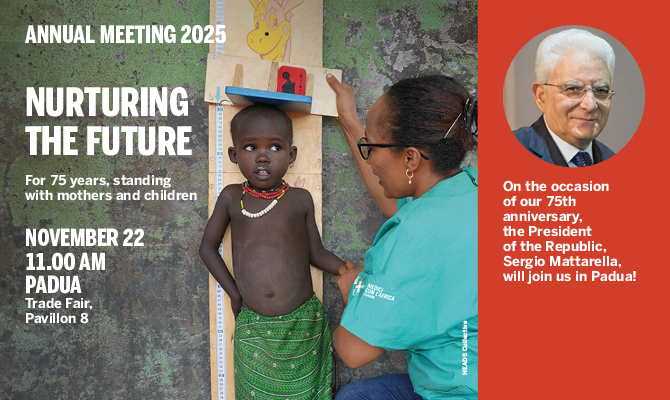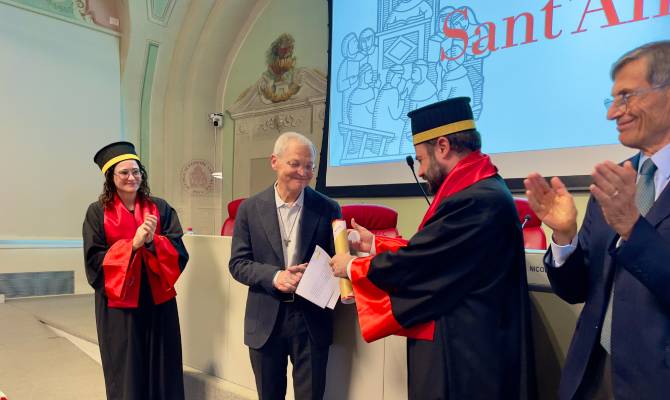About 300 people have attended CUAMM scientific event on operational research and health cooperation held Saturday June 8 at Palazzo Bo, Padua. The event, moderated by the journalist Federico Taddia, was meant to bring attention to the pivotal role played by scientific research in health cooperation in Africa, in the face of emerging challenges by animating the debate on health-related issues and health system management.
Representatives from International istitutions, Italian and African researchers, academics, CUAMM doctors and private foundations have all gathered to take part in the event. Dean of Padua University, Prof. Daniela Mapelli delivered her welcome remarks together with Father Dante Carraro – CUAMM Director and Francesca Benciolini – city council member to international cooperation and peace. Video remarks have also been sent to the public by the Ministry of University and Research Anna Maria Bernini and the EU Commissioner Paolo Gentiloni.
The Director General of the Italian Agency for Development Cooperation – Marco Rusconi took the floor in the early morning stressing the meaning of cooperation and its purpose:
«To cooperate for health promotion in Africa means to pursue the objectives of the Italian Development Cooperation meaning to eradicate poverty and reduce inequalities, to improve the quality of life of disadvantaged populations, to promote sustainable development, protect and defend human rights, individual dignity and gender equality. We adopt a global health approach that leads us to strengthen local health systems not only at national level, but also at the regional and community level. Moreover, we foster a cooperation model that entails research and innovation which is what CUAMM does».
Field research: challenges and new paradigm
Among the speakers, Ana Pilar Betrán – physician from the Department of Sexual and Reproductive Health and Research at the World Health Organization, emphasized that «operational research focuses on the integration of research findings into concrete interventions to promote evidence-based knowledge. The recognizion of factors that can be either barriers or facilitators to the development of good health, is key in the understanding of the context in which we operate. As a matter of fact, knowledge of these factors is essential for adopting sustainable health responses and practices in resource-limited countries»
Regarding CUAMM’s approach to research, Giovanni Putoto – Head of planning and operational research, stated:
«Operational research is an essential tool for understanding the contexts of intervention, indentifying effective actions and unlocking good practices in the aim of improving our work at each and every level of health systems. Since 2013, as research became a pillar of CUAMM strategic plan, we have been working tirelessly to ensure that our field action was closely linked to both the study of those contexts and the health needs of the populations. In eleven years of work, we have published a total of 248 scientific articles in high-value journals, expanding our research network in Italy, Africa, and worldwide».
Voices from the field – Uganda and Tanzania
The agenda was enriched by contributions from researchers who have experienced the work on the field in low-resource settings. Stefano Bonaldi – from the Department of Information Engineering at University of Padua is one of them: «by collaborating with CUAMM and thanks to the support from the Rotary Club Padua North, it was possible for us to develop an innovative solution for malnutrition in Uganda. It is a sort of digital stadiometer that makes it possible for health workers to detect parameters and data in a timely and efficient manner also in rural areas».
«Over the time I spent in the Neonatal ward at the Tosamaganga Hospital in Tanzania, we have carried out a research on neonatal mortality on 5,742 newborns. In the facility, where around 3,000 deliveries are performed every year, many newborns appeared to be either premature or underweight. Through the research we have proved that by training local health personnel and by providing qualified professionals during assisted delivery, it is possible to reduce mortality in newborns who are born weighing less than 5 pounds, 8 ounces. On the contrary, lack of qualified personnel at delivery, is associated to higher mortality rate amidst premature babies. To respond to such results, CUAMM decided to introduce the Kangaroo Mother Care which is an efficient method of care of preterm infants. The method involves infants being carried, usually by the mother, with skin-to-skin contact» said Martina Borellini – CUAMM Paediatrician.
“What it means to treat tuberculosis in contexts like Karamoja, a region in Uganda where the poverty rate reaches 60% and doctors are called to work in extremely fragile conditions” is something Jerry Ictho – CUAMM clinical epidemiologist tried to explained in his speech.
«Through “It’s good – Tb Free Project in Karamoja” project we analyzed how TB treatment has been hindered by social inequalities. To improve treatment, we considered some socio-economic determinants of the population. In parallel, the treatment intervention was strengthened by introducing facilitations such as food provision, transportation, and some innovative micro-financing mechanisms».
Another voice from the field was that of Katunzi Mutalemwa – nurse and MA student in chronic diseases enrolled at Muhimbili University of Health and Allied Sciences, who emphasized that «the biggest challenge in Africa for the care and treatment of patients with chronic diseases is adherence to therapy. From the survey I conducted, it emerged that traditional healers influence patients’ behavior and hinder the correct and continuous intake of life-saving medicines. To overcome this obstacle, I started sending appointment reminders via mobile phone to some patients. With this strategy, 80% of patients with chronic diseases followed the treatment, ensuring the monitoring of their health status».
Voices from the field: Mozambique
Chiara Malesani – medical resident from the University of Padua, spoke about mental health and psychodrama, illustrating the results of a research project that involved 300 adolescents in Mozambique.
«Together with Michela Gatta, Director of the specialization school in Child Neuropsychiatry, we worked to break the stigma surrounding mental health, to recognize and manage emotions, to communicate assertively, and to listen with empathy, adopting effective strategies. The ethno-psychiatric intervention model for the promotion of mental health was tested in terms of feasibility and acceptability so that mental health is not neglected and stigmatized» stated Chiara.
Still from Mozambique, we heard the experience of Edoardo Occa – Anthropologist and community health programs manager at CUAMM in Mozambique regarding the “Familia Modelo” project, carried out with UNICEF to reduce risk factors related to infectious diseases, particularly malaria and diarrheal diseases in contexts exposed to the effects of the climate crisis.
«We work every day in and with the communties to propose and promote to families the adoption of a basket of positive behaviors and simple, cost-free tools that have a concrete impact on the reduction of risk factors. We’re talking about adopting proper hygiene, improving latrine conditions, ensuring there is no stagnant water around the house, and avoiding the presence of animals inside the home. We have integrated care with the ‘caring’ of people and communities, recognizing the importance of social and cultural dimensions».
Roundtable – Perspectives: Partnerships for Operational Research
The value of “networking” for operational research, instead, was the focus of the roundtable conducted by Andrea Atzori – International Relations Manager at CUAMM, together with Annalisa Saracino – Professor of Infectious Diseases at the Department of Precision and Regenerative Medicine and Jonica Area of the University of Bari “Aldo Moro”, Daniele Trevisanuto – Associate Professor of Pediatrics at the Department of Women’s and Children’s Health at the University of Padua, Calistus Wilunda – Associate Researcher at the African Population and Health Research Center (Aphrc) in Kenya, and Gilberto Muraro – President of Fondazione Cassa di Risparmio of Padua and Rovigo.
Professor Alberto Mantovani – Scientific Director of Humanitas greeted the public delivering the conclusions and emphasizing the importance of doing science with Africa because «every time we don’t do research in Africa, we miss an opportunity».





